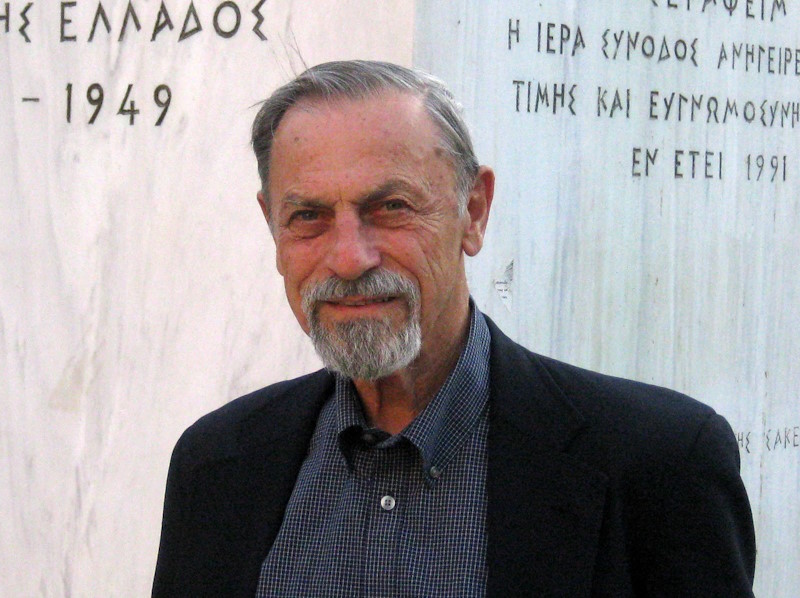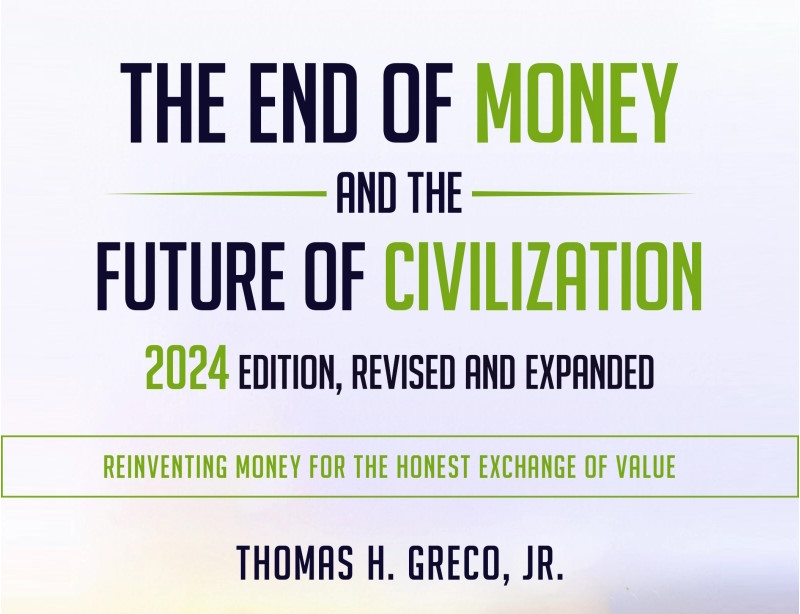Thomas H. Greco Jr.: Advocate for Alternative Financial Systems
https://beyondmoney.net/about/
Thomas H. Greco Jr. has long been a key voice in the movement for monetary reform, particularly through his books The End of Money and the Future of Civilization, New Money for Healthy Communities, and Money and Debt: A Solution to the Global Crisis. In these works, Greco critiques the central role of national currencies and banks in global economic systems, arguing that they contribute to instability, concentration of wealth, and economic inequality. He highlights that traditional monetary systems operate by issuing debt and charging interest, which enriches banks and financial elites while leaving individuals and small businesses trapped in cycles of debt dependency. These centralized systems, according to Greco, undermine local economies by draining wealth and decision-making power from communities.
New 2024 edition of The End of Money and the Future of Civilization:
https://beyondmoney.net/welcome-to-the-new-2024-edition-of-the-end-of-money-and-the-future-of-civilization/
- Greco critiques centralized banking systems in The End of Money and the Future of Civilization.
- National currencies and interest-bearing debt concentrate wealth and power.
- Local economies are weakened by reliance on centralized monetary systems.
The Concept of Peer-to-Peer Mutual Credit Clearing Systems:
In The End of Money and the Future of Civilization, Greco introduces and advocates for peer-to-peer mutual credit clearing systems as a practical and ethical alternative to traditional banking. In this system, participants exchange goods and services directly, without the need for a central monetary authority or national currency. Credit is issued and settled among members based on their productive capacity and trust, eliminating the need for interest-bearing debt. Greco draws on historical examples like barter and cooperative credit systems, positioning mutual credit as a natural extension of these time-tested methods for economic exchange. In New Money for Healthy Communities, Greco emphasizes that this form of credit clearing is vital for creating economic resilience, especially in times of financial crisis.
- Mutual credit systems allow direct exchange without reliance on national currencies.
- The End of Money outlines the mechanics of peer-to-peer credit as an ethical alternative.
- New Money for Healthy Communities stresses the resilience mutual credit brings to communities.
Why Mutual Credit Systems Are Needed in Today’s Economy:
Greco’s book Money and Debt: A Solution to the Global Crisis outlines the ways in which the traditional banking model exacerbates economic volatility and concentrates wealth in the hands of a few. He points to the recurring financial crises, such as the 2008 global financial crash, as clear signs that the conventional debt-based system is unsustainable. Greco argues that local communities often bear the brunt of these crises, as small businesses and individuals are denied access to credit or burdened with crippling debt. Mutual credit systems, as described in Money and Debt, offer a crucial buffer against such volatility by allowing local economies to operate independently of external financial forces, creating a system that is both sustainable and more equitable.
- Money and Debt highlights how traditional financial systems worsen economic crises.
- Local communities suffer from credit shortages and financial instability during crises.
- Mutual credit systems provide a sustainable alternative by allowing local economic independence.
Empowering Small Businesses and Local Economies:
A major focus of Greco’s work, particularly in New Money for Healthy Communities, is the empowerment of small businesses and local economies through decentralized monetary systems. Traditional banking often marginalizes small businesses, either denying them access to credit or offering loans with unfavourable terms. Greco explains that mutual credit systems can empower small businesses by allowing them to trade and secure credit based on their relationships within the local economy, rather than depending on large financial institutions. This not only reduces dependence on banks but also fosters cooperation and trust within local business networks. In The End of Money, Greco stresses that mutual credit systems democratize access to credit and economic opportunity, offering small businesses the freedom to thrive.
- New Money for Healthy Communities promotes mutual credit as a way to empower small businesses.
- Traditional banks often marginalize small enterprises by restricting credit access.
- The End of Money explains how mutual credit democratizes economic opportunity.
A Human-Centered and Cooperative Economy:
In The End of Money and the Future of Civilization, Greco envisions a human-cantered, cooperative economy where economic systems are designed to serve people and communities, rather than the other way around. In contrast to centralized financial systems, which prioritize efficiency and profit, mutual credit systems foster collaboration and reciprocity. Greco emphasizes that in a peer-to-peer system, participants are incentivized to support each other, as economic success becomes a collective goal rather than a competitive endeavour. This shift creates a more sustainable economic model that values long-term community well-being over short-term profit. Greco sees mutual credit as part of a larger movement toward economic democracy, where communities have greater control over their financial destiny.
- The End of Money describes the vision of a human-cantered, cooperative economy.
- Mutual credit systems encourage collaboration over competition.
- Economic democracy is central to Greco’s vision for more equitable and sustainable economies.
Strengthening Economic Sovereignty through Localism:
Greco’s work consistently champions the importance of localism in economic systems. In Money and Debt, he argues that centralized financial models erode local economic sovereignty, as wealth and decision-making power are extracted by distant corporations and banks. Mutual credit systems, by contrast, enable local communities to retain control over their economic interactions. Greco describes these systems as a path toward economic sovereignty, allowing communities to build self-sustaining networks that are resilient to external financial shocks. Local participants in a mutual credit network are not beholden to the whims of national or global markets, and their economic activity becomes grounded in local needs and resources, fostering both economic independence and social cohesion.
- Money and Debt argues that centralized systems undermine local economic sovereignty.
- Mutual credit restores local control over economic transactions and decision-making.
- Economic sovereignty and resilience are achievable through localism and decentralized credit.
Real-World Examples and Potential Applications:
Greco’s works often reference real-world examples of mutual credit systems that have been successfully implemented in various regions. In The End of Money, he highlights the Swiss WIR Bank, a mutual credit system established in the 1930s to facilitate exchanges among businesses. WIR remains a robust example of how mutual credit can support economic activity, even in times of national financial crisis. Greco also examines LETS (Local Exchange Trading Systems) and Sardex in Italy, which have proven effective in enabling local economies to thrive without reliance on traditional currencies. These systems demonstrate the practicality of Greco’s ideas, showing how mutual credit can create vibrant, resilient local economies that operate independently of national or global financial institutions.
- Real-world examples of mutual credit systems include the Swiss WIR Bank, LETS, and Sardex.
- These systems provide evidence of mutual credit’s success in building resilient local economies.
- Greco’s vision has practical applications that help communities thrive in the face of financial challenges.
Credit Lines and Membership in Mutual Credit Exchanges
Grego references Richard Logie of GETS, a moneyless trading platform, provides valuable insights into how credit lines are determined for members' accounts within mutual credit systems. GETS operates on principles similar to those outlined by Greco, focusing on community engagement and reciprocal exchange. Credit lines are established based on members' willingness to participate in the trading system and their demonstrated capacity to fulfil commitments. By assessing members' production capabilities and previous trading behavior, Logie ensures that credit lines are tailored to individual members' circumstances while maintaining the integrity of the system. This approach aligns with Greco’s vision of mutual credit as a system rooted in trust and collaboration, allowing members to engage in meaningful economic exchanges without reliance on traditional banking structures.
https://beyondmoney.net/2012/11/04/complimentary-currency-systems-richard-logie-at-tedxleeds/
- Richard Logie determines credit lines based on members' production capabilities, reputation and trading history.
- GETS emphasizes community engagement and reciprocal exchange.
- Tailored credit lines maintain the system's integrity and align with Greco’s vision.
- Complimentary Currency Systems: Richard Logie at TEDxLeeds https://youtu.be/aUGwF90UXwg
Membership in a mutual credit clearing exchange, such as GETS, provides numerous advantages for participants. Key benefits include:
- Access to Credit: Members can trade without needing national currency, as credit is created through their transactions.
- Enhanced Trading Opportunities: The network facilitates more significant and diverse economic interactions, fostering community resilience.
- Lower Transaction Costs: Without banks acting as intermediaries, members can engage in transactions with lower fees and greater efficiency.
- Strengthened Local Economy: By keeping transactions within the community, local businesses can thrive and retain wealth locally.
- Improved Economic Stability: Mutual credit reduces dependency on traditional banking systems, providing a buffer against economic downturns.
These advantages reflect Greco's belief in the transformative potential of mutual credit systems to foster community well-being and economic resilience.
Standardization for Networked Exchanges:
For mutual credit exchanges to be effectively networked together, certain elements need to be standardized. Greco emphasizes that interoperability among various systems is crucial for enhancing the efficiency and effectiveness of mutual credit networks. Key standardization elements include:
- Uniform Credit Valuation: Establishing common metrics for valuing credits and transactions ensures consistency across different exchanges.
- Interoperable Technology Platforms: Developing compatible technological infrastructure allows for seamless integration and communication between different credit systems.
- Standardized Rules and Regulations: Creating common operational guidelines helps maintain trust and reliability within the network of exchanges.
- Shared Governance Models: Implementing democratic governance structures ensures that all participants have a voice in the decision-making processes that affect the network.
By addressing these standardization needs, mutual credit systems can create robust, interconnected networks that amplify the benefits of peer-to-peer exchanges while aligning with Greco's vision of decentralized economic systems.
Conclusion
Thomas H. Greco Jr.’s body of work, particularly in The End of Money and the Future of Civilization, New Money for Healthy Communities, and Money and Debt: A Solution to the Global Crisis, provides a compelling framework for rethinking how economies function. Through the concept of peer-to-peer mutual credit clearing systems, Greco offers a solution to the fundamental flaws of centralized, debt-based monetary systems. His advocacy for decentralized credit empowers small businesses, strengthens local economies, and restores economic sovereignty to communities. The insights from Richard Logie of GETS further illustrate how these systems can operate effectively in practice. In a world increasingly dominated by volatile global markets and financial elites, Greco’s ideas offer a roadmap for building equitable, resilient, and cooperative economic systems that put people and communities first.

Thomas H. Greco, Jr. is a preeminent scholar, author, educator, and community economist, who, for more than 40 years, has been working at the leading edge of transformational restructuring. He is widely regarded as a leading authority on monetary theory, moneyless exchange systems, community currencies, financial innovation, and community economic development, and is a sought after speaker internationally. He has traveled widely in Europe, Asia, Australia, and the Americas, lecturing, teaching, and advising. He has been a speaker at numerous conferences and has led many workshops and colloquies in many countries around the world.
He is dedicated to transcending the interest-based political debt money system and advises community and business groups on how they can create honest “home-grown” means of payment (liquidity) that can empower small business, provide meaningful employment, and shift control back to local communities


